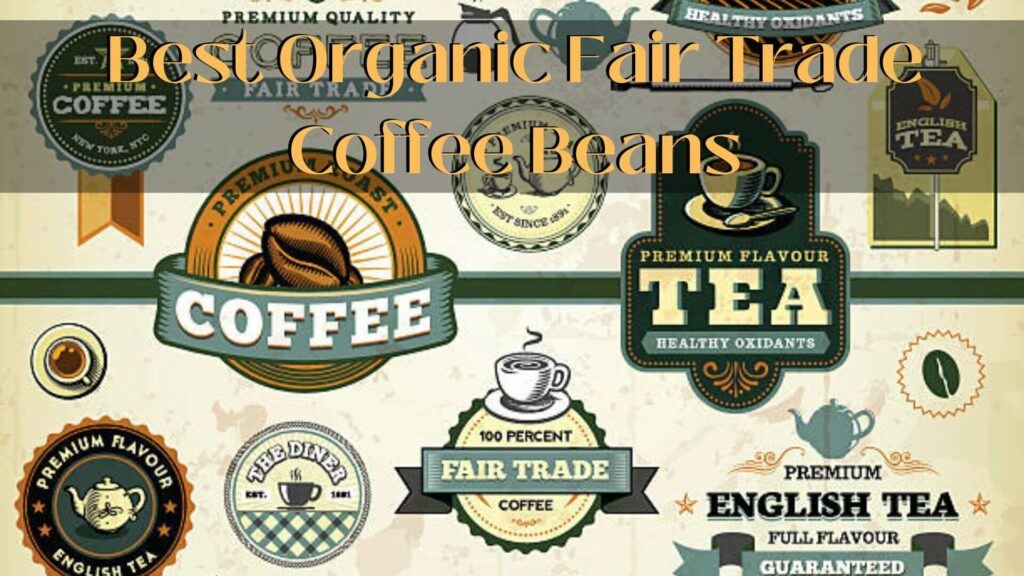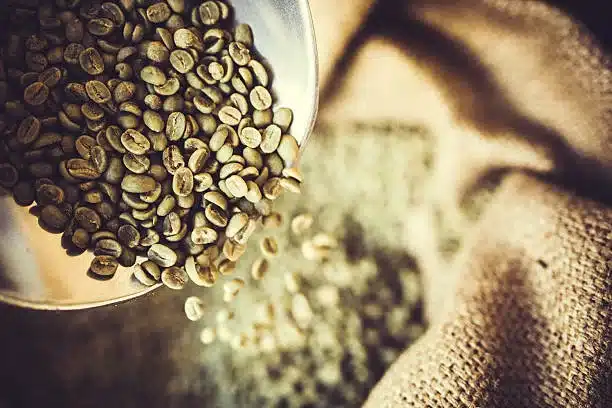Why Specialty Coffee? Great question and if you really want to know more read on!
Good day, fellow coffee enthusiasts! Do you find yourself mindlessly sipping on your instant coffee every morning, wondering what it would be like to taste something that’s not reminiscent of burnt rubber? Well, have no fear because we’re here to tell you that there is hope. Yes, we’re talking about the elusive and often-overpriced specialty coffee.
Now, we know what you’re thinking. “Why should I spend my hard-earned cash on a cup of coffee that’s probably going to taste like dirt water anyway?” But we’re here to tell you that specialty coffee is worth the extra cost – and we’ve got five reasons to prove it.
First and foremost, specialty coffee is made with love. Okay, maybe not actual love, but you get the point. These coffee beans are carefully selected, roasted, and brewed by skilled baristas who take pride in their craft. They’re not just slapping together any old cup of coffee – they’re creating a masterpiece.
Secondly, specialty coffee is a sensory experience. When you drink a cup of specialty coffee, it’s not just about the taste. It’s about the aroma, the texture, the temperature – every aspect of the coffee is carefully considered to create the ultimate drinking experience. It’s like a symphony for your taste buds.
Thirdly, specialty coffee is sustainable. You may be thinking, “But isn’t all coffee sustainable?” The short answer is no. Specialty coffee is often sourced from smaller, independent farms that prioritize sustainability practices. So not only are you getting a delicious cup of coffee, but you’re also supporting ethical and environmentally-friendly practices.
Fourthly, specialty coffee is a conversation starter. Imagine being at a dinner party and casually dropping in that you’re a connoisseur of specialty coffee. Suddenly, you’re the most interesting person in the room (sorry, Steve from accounting). People will want to know all about your coffee habits, where you get your beans from, and how you take your coffee.
And finally, specialty coffee is just plain fun. Trying out new coffee shops, experimenting with different brewing methods, and discovering new flavor profiles – what’s not to love?
So there you have it, folks—five reasons why specialty coffee is worth the extra cost. But don’t worry if you don’t want to break the bank – we’ve got some tips on enjoying specialty coffee in the comfort of your home. So grab your favorite mug and get ready to taste the difference!
What Is Specialty Coffee?

Ah, specialty coffee. It’s the elixir of the gods, the nectar of the coffee gods, the fuel that keeps us going throughout the day. But what exactly is specialty coffee, you ask? Well, sit back, relax, and let me enlighten you.
Specialty coffee is not your average cup of Joe. It’s not the stuff you find in those giant tins at the supermarket or the watery concoction that comes out of those office coffee machines. No, specialty coffee is a cut above the rest. It’s the cream of the crop, the top tier of the coffee world.
But what makes it so special, you may ask? Well, for starters, specialty coffee is made from high-quality coffee beans. These beans are carefully selected and sourced from specific regions around the world, where they’re grown in the perfect climate and altitude. They’re then roasted to perfection by master roasters who know exactly how to bring out the best flavors and aromas.
But it’s not just the beans that make specialty coffee so special. It’s the people behind the scenes who make it all happen. Specialty coffee is made by skilled baristas who take their craft seriously. They’re not just slinging coffee like it’s a chore – they’re creating a work of art. They know exactly how to grind the beans, measure the water, and brew the coffee to bring out the best possible flavors.
And let’s not forget about the sensory experience of specialty coffee. When you drink a cup of specialty coffee, it’s not just about the taste. It’s about the aroma, the texture, and the overall experience. Every aspect of the coffee is carefully considered to create the ultimate drinking experience.
Now, you may be thinking, “Okay, but isn’t specialty coffee just a fancy way of saying expensive coffee?” And while it’s true that specialty coffee can be pricier than your average cup of coffee, it’s important to remember that you’re paying for quality. You’re paying for the expertise of the roasters and baristas, the high-quality beans, and the overall experience.
So there you have it, folks. Specialty coffee is not just a beverage – it’s a way of life. It’s for those who appreciate life’s finer things and want to start their day off on the right foot.

The Difference Between Specialty Coffee and Regular Coffee
Ah, the eternal debate between specialty coffee and regular coffee! As a coffee aficionado, I’m happy to shed some light on this caffeinated topic.
First of all, let’s define our terms. Regular coffee, also known as commodity coffee, is typically made from mass-produced beans that are grown in large quantities and often blended together. This type of coffee is what you might find in your local diner or gas station, and it’s usually roasted to a medium or dark level to provide a consistent flavor profile.
On the other hand, specialty coffee is made from high-quality beans that have been carefully selected and roasted to bring out their unique flavors and aromas. These beans are often grown in specific regions with ideal growing conditions, and they’re typically roasted to a lighter level to preserve their natural characteristics. Artisanal cafes and roasteries often serve specialty coffee, and it’s considered by many to be a gourmet treat.
Now, you might be thinking, “But coffee is coffee, right? What’s the big deal?” Well, let me tell you, there’s a world of difference between specialty coffee and regular coffee. Specialty coffee is like a fine wine, with complex flavor notes and a nuanced aroma. It’s meant to be savored and appreciated rather than simply consumed as a caffeine delivery system.
On the other hand, regular coffee is more like a trusty old pair of jeans. It’s comfortable and familiar, and it gets the job done. There’s nothing wrong with drinking regular coffee, but if you want to take your coffee game to the next level, specialty coffee is the way to go.
In summary, specialty and regular coffee are all about quality and attention to detail. Specialty coffee is made from carefully selected beans that are roasted to perfection, while regular coffee is typically mass-produced and roasted to a medium or dark level for a consistent flavor profile. So, if you want to elevate your coffee experience, try specialty coffee – your taste buds will thank you!
a must read for all who love coffee and camping
“Coffee and camping go together like marshmallows and fire pits. There’s something about waking up in the great outdoors and sipping on a hot cup of joe that just feels right. It’s like the perfect way to say ‘good morning’ to nature. Plus, let’s be real, coffee is essential for any camping trip. How else are you supposed to stay awake and alert while fending off those pesky mosquitoes and telling ghost stories around the campfire?”
The Unique Flavor Profile of Specialty Coffee
Ah, specialty coffee’s unique flavor profile is like a symphony for your taste buds! As a coffee lover, I’m excited to dive into the complex and delicious world of specialty coffee flavors.
First of all, let’s establish that specialty coffee is not just your average cup of joe. It’s made from high-quality beans that have been carefully selected and roasted to bring out their unique flavors and aromas. These beans are often grown in specific regions with ideal growing conditions, and they’re typically roasted to a lighter level to preserve their natural characteristics.
So, what makes the flavor profile of specialty coffee so special? Well, for starters, each type of specialty coffee has its own unique flavor profile, depending on factors like where the beans were grown, the altitude at which they were grown, and the type of soil in which they were grown.
For example, coffee grown in Ethiopia is known for its fruity and floral notes, while coffee grown in Colombia is known for its nutty and chocolatey flavors. And within each country, there are even more variations in flavor depending on the specific region and growing conditions.
In addition to these regional differences, specialty coffee also has a wider range of flavors than regular coffee. This is because the beans are often roasted to a lighter level, which preserves the subtle flavors and aromas that can be lost in darker roasts.
So, what kind of flavors can you expect to find in specialty coffee? Well, it could be anything from bright and acidic to smooth and chocolatey. You might taste notes of citrus, berries, nuts, or even floral flavors like jasmine or lavender. And the aroma of specialty coffee can be just as complex and intriguing as the flavor, with hints of caramel, vanilla, or even tobacco.
In summary, the unique flavor profile of specialty coffee is all about complexity, variety, and attention to detail. Each coffee type has its distinct flavor profile, depending on factors like where the beans were grown, how they were roasted, and the specific brewing method.

Ethical and Sustainable Sourcing Practices in Specialty Coffee
Ethical and sustainable sourcing practices in specialty coffee aim to promote fair labor practices, protect the environment, and support local communities. Some of the key practices include:
- Direct trade: Specialty coffee companies establish direct relationships with coffee farmers and cooperatives, ensuring that the farmers receive fair prices for their products and have access to resources and training.
- Fairtrade certification: Some specialty coffee companies participate in fair trade certification programs, which require that farmers receive a minimum price for their products and adhere to certain social and environmental standards.
- Organic certification: Specialty coffee companies often seek out coffees that are certified organic, which means that they are produced without the use of synthetic pesticides and fertilizers.
- Shade-grown coffee: Shade-grown coffee is grown under a canopy of trees, which provides a habitat for birds and other wildlife and helps to protect the soil from erosion.
- Environmental stewardship: Specialty coffee companies work to minimize their environmental impact by using sustainable packaging, reducing waste, and implementing energy-efficient practices in their operations.
- Social responsibility: Specialty coffee companies often support local communities by providing education and healthcare resources and investing in infrastructure projects.
Overall, ethical and sustainable sourcing practices in specialty coffee aim to ensure that coffee production is socially responsible, environmentally sustainable, and economically viable for everyone involved in the supply chain.
related article in just another cuppa coffee
Coffee is the world’s second-most traded commodity after oil. It’s a daily ritual for millions of people worldwide and an essential source of income for millions of coffee farmers in developing countries. However, the coffee industry has been plagued by issues such as unfair trade practices, environmental degradation, and poor working conditions. That’s why the rise of organic fair-trade coffee beans has been a game-changer for both farmers and consumers.
The Heightened Coffee Experience of Specialty Coffee
Oh, specialty coffee, the elixir of the gods! The mere mention of it sends shivers down my spine and makes my taste buds dance with delight. It’s not just a drink, my friend – it’s an experience. A heightened coffee experience, if you will.
First things first, forget your grandma’s instant coffee. Specialty coffee is a whole different ballgame. It’s like comparing a bicycle to a Lamborghini – sure, they both get you from point A to point B, but one does it in style and with much more horsepower.
From the moment you take your first sip of specialty coffee, you’ll notice the difference. It’s like a symphony of flavors dancing on your tongue – notes of chocolate, caramel, and citrus, all perfectly balanced to create a taste that is simply divine.
And let’s not forget about the aroma. The scent of freshly brewed specialty coffee is enough to make even the grumpiest of morning people crack a smile. It’s like a warm hug in a mug – comforting and inviting.
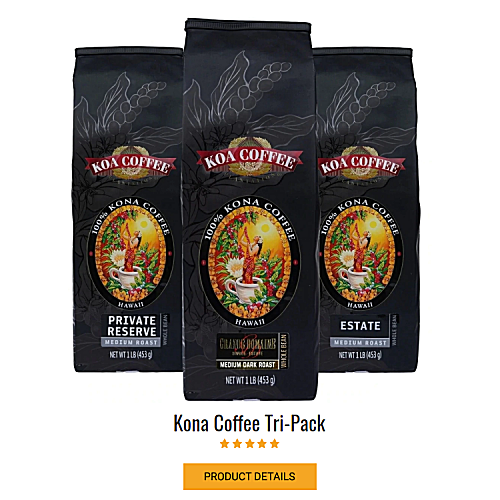
But it’s not just about the taste and aroma but the entire experience. It’s about the process of making the perfect cup, from selecting the beans to grinding them just right to brewing them with precision. It’s about the artistry of latte art and the science of milk frothing.
And don’t even get me started on the culture of specialty coffee. It’s a community of like-minded individuals who love and appreciate the bean. It’s a world of baristas, roasters, and coffee nerds who are passionate about every aspect of the coffee-making process.
So, my friend, if you haven’t experienced the heightened coffee experience of specialty coffee, it’s time to step up your game. Leave the instant coffee on the shelf and treat yourself to a cup of pure magic. Your taste buds (and your soul) will thank you.
How To Brew Specialty Coffee At Home
Brewing specialty coffee at home is a great way to enjoy high-quality coffee without having to leave your house. Here’s a step-by-step guide on how to brew specialty coffee at home:
- Start with high-quality coffee beans: Specialty coffee is all about using fresh beans. Look for freshly roasted beans and have a roast date on the bag.
- Grind the beans: Grind the beans just before brewing to ensure maximum freshness. Use a burr grinder to achieve a consistent grind size.
- Choose your brewing method: There are many different ways to brew specialty coffee, such as pour-over, French press, AeroPress, and espresso. Choose the method that best suits your taste and equipment.
- Heat the water: Heat water to the appropriate temperature for your brewing method. The ideal temperature for brewing specialty coffee is between 195-205°F (90-96°C).
- Brew the coffee: Follow the instructions for your chosen brewing method. Be sure to measure the coffee and water ratios precisely to ensure a consistent and flavorful cup.
- Serve and enjoy: Pour the brewed coffee into your favorite mug and enjoy your specialty coffee’s rich aroma and complex flavors.
Here are a few additional tips for brewing specialty coffee at home:
- Use clean equipment to avoid any residual flavors or oils from previous brews.
- Experiment with different brewing methods and grind sizes to find your perfect cup.
- Keep your beans in an airtight container away from light, heat, and moisture to maintain freshness.
- Use filtered water for brewing to avoid any impurities or unwanted flavors.
With these tips and tricks, you’ll be able to brew delicious and high-quality specialty coffee right in the comfort of your own home.
Tips For Selecting and Storing Specialty Coffee Beans
KKC air tight coffee storage sealed glass containers
- 2 X 40 Fluid Oz Sealed Air Tight Jars
- Ornate Bamboo Shelf
- Serving Spoon
- Perfect For Storing Ground or Whole Bean Coffee & Looks Great In Any Kitchen
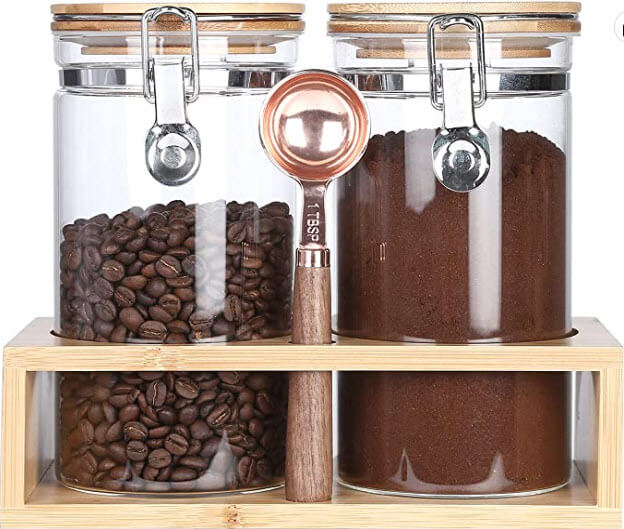
Selecting and storing specialty coffee beans properly is crucial to ensure that you get the best possible flavor and aroma from your coffee. Here are some tips for selecting and storing specialty coffee beans:
- Choose high-quality, fresh beans: Look for freshly roasted beans, ideally within the last two weeks, and have a roast date on the packaging. Specialty coffee shops and roasters are usually the best places to find high-quality beans.
- Consider the origin and roast level: Different coffee beans have distinct flavor profiles depending on their origin and roast level. Experiment with different beans to find the flavors you prefer.
- Look for specialty coffee certifications: Look for specialty coffee certifications such as Fair Trade, Rainforest Alliance, or Organic, which indicate that the beans have been ethically sourced and produced.
- Smell the beans: Sniff them to see if they have a strong, fresh aroma. They are likely past their prime if the beans smell stale or musty.
- Store the beans properly: Store your beans in an airtight container away from light, heat, and moisture. Avoid storing your beans in the fridge or freezer, as they can absorb unwanted flavors and moisture.
- Grind the beans just before brewing: Grind your beans just before brewing to ensure maximum freshness and flavor. Use a burr grinder to achieve a consistent grind size.
- Use the beans within two weeks: Specialty coffee beans are best consumed within two weeks of the roast date to ensure maximum freshness and flavor.
By following these tips, you’ll be able to select and store specialty coffee beans properly and enjoy the rich aroma and complex flavors of your coffee.
Specialty Coffee Subscription Services

Specialty coffee subscription services are monthly or weekly delivery services that provide subscribers with a regular supply of high-quality specialty coffee beans. These services often feature unique and interesting coffee blends and single-origin coffees that are carefully selected and roasted by experienced roasters.
The primary benefit of specialty coffee subscription services is that they provide customers with a convenient way to discover and enjoy new coffee flavors and roasts from around the world. Many subscription services also offer educational resources and information about each coffee they provide, which can help customers learn more about each bean’s origin and flavor profile.
Here are a few popular specialty coffee subscription services that you might want to check out:
- Trade Coffee: Offers personalized coffee recommendations based on a customer’s taste preferences and brewing method.
- Blue Bottle Coffee: Features single-origin coffees and blends that are carefully curated by experienced roasters.
- Atlas Coffee Club: Provides subscribers with coffee from a different country every month, along with detailed information about each coffee’s origin and flavor profile.
- Driftaway Coffee: Offers personalized subscriptions based on a customer’s taste preferences and donates a portion of each sale to coffee farmers.
- Angels’ Cup: Provides customers with blind coffee tastings that come in black bags without branding, allowing them to try and identify each coffee’s origin and flavor profile.
- Bean Box: Features coffee from Seattle’s top roasters, with a focus on single-origin coffees and blends.
- Crema.co: Offers personalized subscriptions based on a customer’s taste preferences and roast level and sources coffee directly from small farmers and cooperatives.
It’s important to note that many other specialty coffee subscription services are available, and each one may have unique offerings and benefits. So, it’s worth doing some research to find the one that best suits your needs and preferences.
My personal preference and highly recommended would be the coffee subscription offer from Life Boost Coffee.
Get The Top 2% Of The World’s Coffee To Your Door— For as Long- or Short- As You LikeWelcome to the world of Life Boost Coffee, where your mornings are about to get a whole lot better! Imagine waking up to the rich aroma of freshly roasted, organic coffee beans, handpicked from the lush mountains of Nicaragua.
With our coffee subscription, you’ll never have to settle for a bland, boring cup of joe again. Our master roasters take pride in crafting the perfect blend of coffee, ensuring that every sip is a delightful experience for your taste buds.
But that’s not all. Our coffee is not only delicious but also good for you. Our beans are grown without any harmful pesticides or chemicals, ensuring that you get a healthy boost with every cup.
And the best part? You don’t have to worry about running out of your favorite coffee ever again! With our subscription service, we’ll deliver your coffee straight to your door on a schedule that suits you. Plus, you can customize your subscription to get the perfect amount of coffee for your needs.
So, what are you waiting for? Check out the Life Boost Coffee subscription below today and start enjoying the ultimate coffee experience!
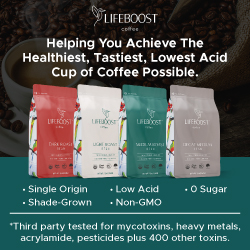
The Cost of Specialty Coffee Compared to Regular Coffee
Ah, the age-old question: what’s the deal with specialty coffee, and why is it so dang expensive? Well, my friend, let me break it down for you.
First of all, let’s get one thing straight: specialty coffee is not your average cup of joe. It’s not the stuff you get at the gas station or the diner down the street. No, no, no. Specialty coffee is a whole different ballgame. We’re talking about carefully sourced, high-quality beans that are roasted to perfection by skilled artisans.
Now, I know what you’re thinking. “But Mark, that sounds fancy. And expensive. Is it really worth it?” And to that, I say: yes, yes it is.
Think about it this way. You could go to McDonald’s and get a burger for a few bucks. Or, you could go to a fancy steakhouse and spend a small fortune on a filet mignon. Are they both technically beef? Sure. But are they the same thing? Absolutely not.
It’s the same with coffee. Sure, you could get a cheap cup of coffee from a vending machine or a drive-thru. But if you want to experience the full range of flavors and nuances coffee offers, you need to go specialty.
So, is specialty coffee more expensive than regular coffee? Yes, it is. But is it worth it? Also yes. You’re not just paying for the coffee itself; you’re paying for the care and attention that went into sourcing and roasting it. You’re paying for the expertise of the barista who brewed it. And most importantly, you’re paying for the experience of enjoying a truly exceptional cup of coffee.
So, my friend, the next time you’re faced with the choice between a cheap cup of joe and a specialty coffee, ask yourself this: do I want to settle for mediocre, or do I want to treat myself to something truly special? The choice is yours.
Why Specialty Coffee Conclusion
In conclusion, folks, specialty coffee is worth the extra cost for plenty of reasons. From the rich, nuanced flavors to the careful sourcing and roasting of high-quality beans, specialty coffee is truly a cut above the rest. And with a few tips and tricks, you can even enjoy it in your home.
But let’s be real: if you think spending more than $5 on a cup of coffee is outrageous, specialty coffee might not be for you. And that’s okay! You do you, boo. But for those of us who are willing to splurge on a truly exceptional cup of joe, specialty coffee is the way to go.
So go ahead, and treat yourself to a cup of specialty coffee. Bask in the rich, complex flavors and savor every sip. And if anyone tries to judge you for spending a little extra on your coffee, just shrug it off and say, “Hey, it’s not a luxury, it’s a necessity.” After all, life’s too short to settle for mediocre coffee.



